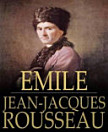On the Origin of Inequality
Nov 2005 · Cosimo, Inc.
Ebook
100
Pages
family_home
Eligible
info
reportRatings and reviews aren’t verified Learn More
About this ebook
If we look at human society with a calm and disinterested eye, it seems, at first, to show us only the violence of the powerful and the oppression of the weak. The mind is shocked at the cruelty of the one, or is induced to lament the blindness of the other...-from the PrefaceAre such concepts of race, class, and wealth inherent to the human condition, or are they results of the development of "civilization"? One of the most important thinkers of the Enlightenment, which laid the groundwork for the modern mind-set, argues that it is only with the creation of agriculture and urban society that inequalities formed. Controversy swirls around the text-some of today's thinkers continue to consider it profound; others contend that it relies on an unsupportable "noble savage" foundation. In either case, this 1752 is one of the greatest works of 18th-century philosophy.Swiss philosopher JEAN JACQUES ROUSSEAU (1712-1778) was a dramatic influence on the French revolution, 19th-century communism, and much modern political thought. His works include Discourse on the Arts and Sciences (1750), Discourse on Political Economy (1755), and The Social Contract, Or Principles of Political Right (1762).
About the author
Jean Jacques Rousseau was a Swiss philosopher and political theorist who lived much of his life in France. Many reference books describe him as French, but he generally added "Citizen of Geneva" whenever he signed his name. He presented his theory of education in Emile (1762), a novel, the first book to link the educational process to a scientific understanding of children; Rousseau is thus regarded as the precursor, if not the founder, of child psychology. "The greatest good is not authority, but liberty," he wrote, and in The Social Contract (1762) Rousseau moved from a study of the individual to an analysis of the relationship of the individual to the state: "The art of politics consists of making each citizen extremely dependent upon the polis in order to free him from dependence upon other citizens." This doctrine of sovereignty, the absolute supremacy of the state over its members, has led many to accuse Rousseau of opening the doors to despotism, collectivism, and totalitarianism. Others say that this is the opposite of Rousseau's intent, that the surrender of rights is only apparent, and that in the end individuals retain the rights that they appear to have given up. In effect, these Rousseau supporters say, the social contract is designed to secure or to restore to individuals in the state of civilization the equivalent of the rights they enjoyed in the state of nature. Rousseau was a passionate man who lived in passionate times, and he still stirs passion in those who write about him today.
Rate this ebook
Tell us what you think.
Reading information
Smartphones and tablets
Install the Google Play Books app for Android and iPad/iPhone. It syncs automatically with your account and allows you to read online or offline wherever you are.
Laptops and computers
You can listen to audiobooks purchased on Google Play using your computer's web browser.
eReaders and other devices
To read on e-ink devices like Kobo eReaders, you'll need to download a file and transfer it to your device. Follow the detailed Help Center instructions to transfer the files to supported eReaders.








